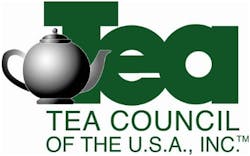Consumers Rally Around Tea As A Healthy Beverage Choice
Source The Tea Council of the USA, Inc.
NEW YORK, Jan. 7, 2015 /PRNewswire/ -- The new year brings a perfect opportunity to start fresh and focus on personal happiness, health and overall wellness. After the season of giving to others, the new year and new year's resolutions are about taking care of oneself—whether it's running a marathon or just remembering to take a few minutes out of a busy day to relax. This January, in honor of National Hot Tea Month, the Tea Council of the USA encourages people to rejuvenate with a cup of tea. Hot tea warms the body, can promote relaxation and has been found to have many health benefits. What's more, there are more varieties of tea than one might think—so it's the perfect time to explore, experience and enjoy this ubiquitous beverage.
Approximately four out of five consumers drink teai. The American Botanical Council attributes the U.S. interest in tea to a growing awareness of health and wellness and the positive research on the health benefits of tea.ii While 84 percent of all tea consumed in the U.S. is black tea, Peter Goggi, President of the Tea Council of the USA says, "There are many intriguing forms and flavors of this healthy beverage to satisfy each taste preference, whether it be black, green, oolong or white." In addition, Goggi notes, "Not only does tea taste great, but there is a large and growing body of research backing it as a healthy, good-for-you beverage."
Tea is steeped in health benefits
Tea contains no sodium, fat, carbonation, or sugar and is virtually calorie-free. Thousands of published studies in leading medical journals support the potential health benefits of drinking tea. The major bioactive compounds in tea, called flavonoids, have been linked with the beverage's healthful properties. In fact, the December 2013 issue of the American Journal of Clinical Nutrition published 12 studies about tea's role in cardiovascular health, cancer prevention, metabolism and brain function.
- Tea and Body Weight: In one review, researchers concluded that subjects consuming green tea and caffeine lost an average of 2.9 pounds within 12 weeks while adhering to their regular diet. The results of another meta-analysis suggest the increase in caloric expenditure is equal to about 100 calories over a 24-hour period. The weight loss benefits of tea vary based on many factors, but studies have found benefits with the equivalent of as little as 2.5 cups of green tea.
- Tea and Bone Health: Research suggests that polyphenols in green tea may help improve bone quality and strength. One study found that drinking tea was associated with a 30 percent reduced risk in hip fractures among men and women 50 years of age or older.
- Tea and Mood, Mental Alertness & Problem Solving: A study found that drinking tea improved attention and allowed individuals to be more focused on the task at hand. In this placebo-controlled study, subjects who drank tea produced more accurate results during an attention task and also felt more alert than subjects who drank a placebo. These effects were found for two to three cups of tea consumed within 90 minutes. It is thought that caffeine and the amino acid theanine, both present in tea, contribute to many of tea's psychological benefits.
- Tea and Heart Health: A study published by Claudio Ferri, MD, University L'Aquila, Italy found that black tea reduced blood pressure, and among hypertensive subjects, it helped counteract the negative effects of a high-fat meal on blood pressure and arterial blood flow. The study also indicated that consuming one cup of tea per day may reduce incidence of stroke and heart attacks by 8 to 10 percent.
- Tea and Ovarian Cancer: A new study published in the November 2014 issue of the American Journal of Clinical Nutrition tracked habitual flavonoid intakes among study participants. Researchers found that the women who consumed foods high in flavonols and flavonones – found in tea, red wine, apples, grapes and citrus fruit and juices – had a lower risk of developing endothelial ovarian cancer. The authors reported that the women who drank two cups of black tea per day saw a 31 percent reduction in cancer risk.
So brew up a cup!
It's easy to brew a cup of tea, either from loose leaf tea or tea bags. To brew a cup of hot tea, bring cold, filtered water to a full boil in a teapot. Use one tea bag or one teaspoonful of loose tea per cup of water. Pour the boiling water over the tea and steep for three to five minutes.
Visit the Tea Council of the USA or follow @TeaCouncil on Twitter to learn more about the many health benefits and varieties of tea.
About the Tea Council of the USA:
The Tea Council of the USA is a non-profit association that was formed in 1950 as a joint partnership between tea packers, importers and allied industries within the United States, and the major tea producing countries. It functions as the educational arm of the tea industry with a primary goal of increasing overall awareness of tea by providing information about its many positive attributes. One of the Council's primary objectives is the dissemination of key scientific findings about tea to the public. The Tea Council does this in several ways including: funding scientific meetings to bring tea researchers from around the world together to share key information and identify next steps for future research projects; and working with health organizations and international scientists to disseminate information about potential positive health effects of tea consumption on a public level.
i Daymon Worldwide, Hot Tea Category Overview, October 2014
ii American Botanical Council, Tea Market Report, November 2014





